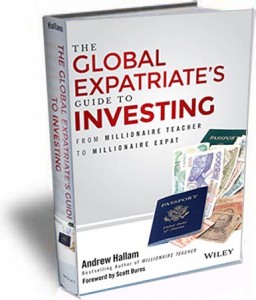With the ever-increasing growth of globalization, the number of expats working overseas is also steadily increasing; over 200 million at last count. Many of these employees have given up corporate or national pensions behind as they seek a new life abroad. Often they will be approached by unscrupulous financial advisors or investment fund managers, promising a secure retirement…if you hand over your money to them. However, outsized commissions and lots of expensive, unexplained fine print usually accompany these promises. There is a better path to financial freedom and it is outlined in Andrew Hallam’s recent financial book.
The Global Expatriate’s Guide to Investing provides helpful, informative and unambiguous advice to those who have chosen to work outside their home countries. Whether you are a British teacher in Japan, a Canadian engineer in Thailand or an American working in China’s growing animation industry, this book will help you on your path to financial freedom.
Andrew Hallam is a personal finance columnist, financial educator, and speaker. He writes columns for The Globe and Mail and contributes frequently to Canadian Business magazine as well as MoneySense and Readers Digest. Hallam has been an expatriate since 2003. This most recent book follows in the footsteps of his previous international bestseller, Millionaire Teacher.
“Hallam offers a sensible, actionable game plan that lays out how to set up and manage an effective portfolio of investments, no matter what your country of origin. The Global Expatriate’s Guide to Investing is filled with simple investment methods that work. The text’s illustrative examples include information on cap-weighted indexing, fundamental indexing, and creating a “Permanent Portfolio” which mixes differing asset clauses.”
As a retired expatriate with next to no investment experience, I found this book a very clear and concise explanation of today’s financial landscape. It is a must read for anyone thinking of working or retiring overseas. Although written for expats, the evidence-backed information it contains applies to all. The fact that the last eight chapters are country-specific gives you an idea of the detailed investment advice provided by the book.
With several years of experience working in International Schools, I could relate to his stories of unethical financial advisors who prey on those working in foreign countries. Hallam describes what financial investment firms people should avoid with a ten-foot pole and a bunch of firms people should feel good about using. For those working overseas who don’t have a pension or another reliable financial safety net, this book will allow you to take charge of your own investing to provide for a generous retirement, instead of lining the “experts'” pockets with your hard-earned money.
I would highly recommend this hands-on and entertaining guide to anyone working overseas, especially those that have forsaken their home-country pensions or retirement savings plans. Hallam has always practiced what he preaches and includes many of his own experiences as common sense examples of successful investing, accompanied by a great sense of humour. I only wish that I had read a book such as this when I first started working overseas.






Leave a Reply